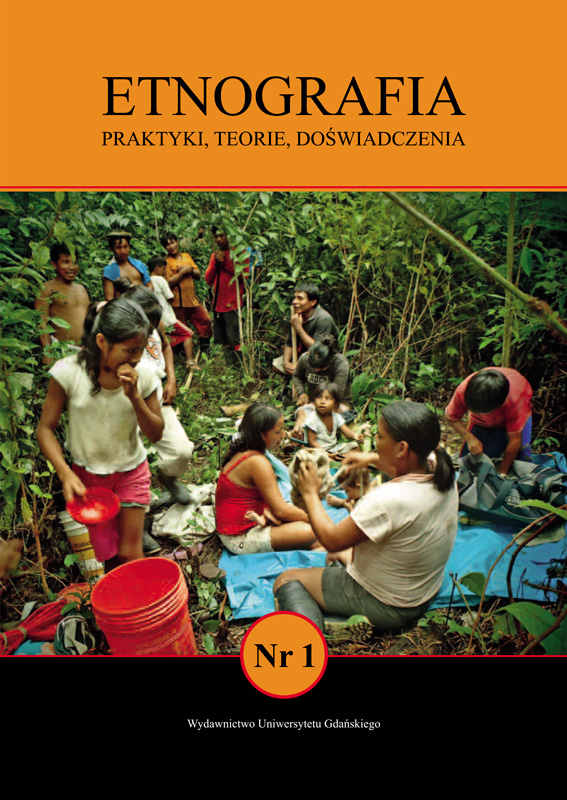The Inter-University Anthropology Conference – Anthropology in the eyes of beginner researchers
DOI:
https://doi.org/10.4467/254395379EPT.15.011.6476Keywords:
he Inter-University Anthropology Conference (MKA), engaged anthropology, cultural anthropology, research methods, research ethics, field, researcher-research subject relationship, experience of researcherAbstract
Clifford Geertz noted that anthropology is the art of writing. Anthropological knowledge reinforces forging of one’s own field experience in the narrative about this experience. One possible form of this narrative is an academic text – but it is not the only one. It can also take a form of the exchange of ideas and discussion among anthropologists, which validates the knowledge and helps find an appropriate way of expressing it. This form of free and creative flow of ideas, experiences, thoughts and reflections has also been recognised by the students of anthropology in Poland. The need for discussion among practitioners of this discipline emerges from early field experience, acquired during a fieldwork session included in the program of their studies. Inter-university ethnographic workshops were organized as a part of ethnographic studies in Poland after the World War II, allowing young ethnographers to establish professional and social networks outside their own universities. However, the tradition of such meetings was eventually abandoned – last workshop of this kind was held in 1988. Young anthropologists, who are starting their research careers, have decided to create their own space, which will enable them to exchange ideas and help share experiences, knowledge, and doubts. This led to the emergence of the Inter-University Anthropology Conference (MKA), which encouraged the contact between young beginner anthropologists from all centres in Poland. The first MKA was held in Poznan in 2007 and since then it has been organized annually at different academic centres. By analysing the subsequent MKAs we try to trace various ways of conceptualizing and practising anthropology among young academics. We were particularly interested in issues which they chose to study. By looking through the lens of the MKAs, we are considering the specifics of each conference, the topics that they tackled as well as if they are any indications of research themes that are particularly characteristic of young researchers.
Downloads
References
Barley, N. (1997). Niewinny antropolog. Notatki z glinianej chatki. Przeł. E. Szyler. Warszawa: Prószyński i S-ka.
Buliński, T., Kairski, M. (red.). (2011). Teren w antropologii. Praktyka badawcza we współczesnej antropologii kulturowej. Poznań: Wyd. Naukowe UAM.
Clifford, J. (2004). Praktyki przestrzenne: badania terenowe, podróże i praktyki dyscyplinujące w antropologii. Przeł. S. Sikora. W: E. Nowicka, M. Kempy (red.), Badanie kultury. Elementy teorii antropologicznej. Kontynuacje (s. 139–179). Warszawa: Wydawnictwo Naukowe PWN.
Geertz, C. (2000). Dzieło i życie. Atnropolog jako autor. Przeł. E. Dżurak, S. Sikora. Warszawa: Wyd. KR.
Kaniowska, K. (2010). Etyczne problemy badań antropologicznych. W: K. Kaniowska,
N. Modnicka (red.), Etyczne problemy badań antropologicznych (s. 19–31). Wrocław-Łódź: PTL, „Łódzkie Studia Etnograficzne”, t. 49.
Kaniowska, K., Modnicka, N. (red.). (2010). Etyczne problemy badań antropologicznych. Wrocław–Łódź: PTL, „Łódzkie Studia Etnograficzne”, t. 49.
Koziura, K. (2009). Kiedy antropolog bada „kulturę własną” (wystąpienie konferencyjne). III Międzyuczelniana Konferencja Antropologiczna, 22 stycznia 2009, Poznań.
Sikora, S. (2009). Odwrócone spojrzenie albo antropologizacja antropologii. W: A. Pomieciński, S. Sikora (red.), Zanikające granice. Antropologizacja nauki i jej dyskursów (s. 59–86). Poznań: Telgte.
Wróblewski, F. (2011). Teren w ścisłym tego słowa znaczeniu. Barbarzyńca. Pobrane z: http://www.barbarzynca.com/aktualnosci/teren-w-scislym-tego-slowa-znaczeniu, dostęp: 05.06.2014.
Zawistowicz-Adamska, K. (1948). Społeczność wiejska. Doświadczenie i rozważania z badań terenowych w Zaborowie. Łódź: Polski Instytut Służby Społecznej.
Downloads
Published
Versions
- 2023-10-17 (2)
- 2015-10-01 (1)
How to Cite
Issue
Section
License
Czasopismo wydawane jest na licencji Creative Commons Uznanie autorstwa-Na tych samych warunkach 4.0 Międzynarodowe.

 Academic Scientific Journals
Academic Scientific Journals








